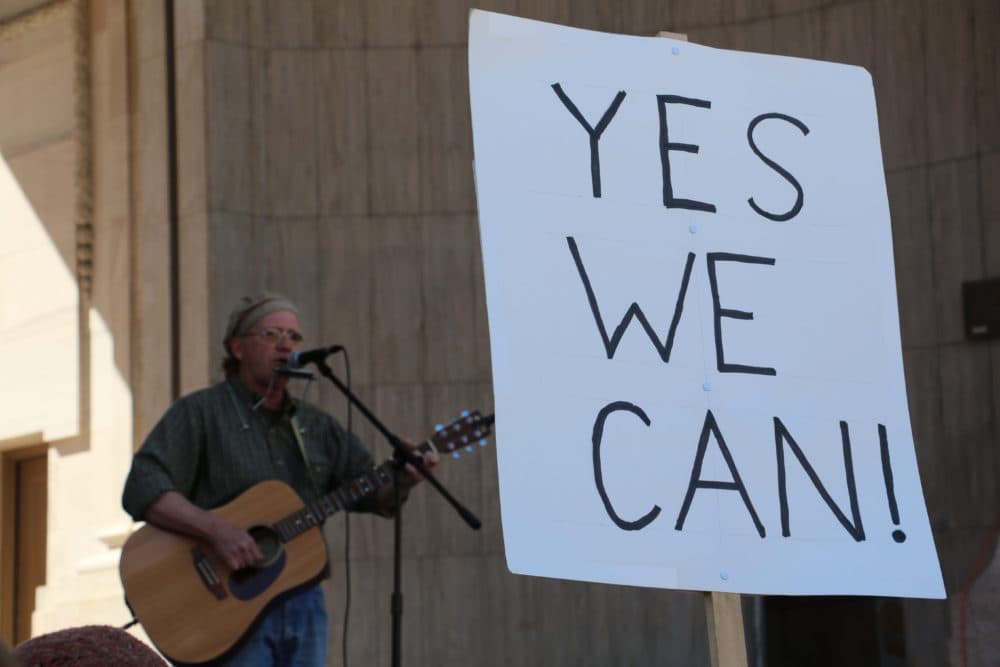
Nicholas Riccardi, Associated Press
Stationing herself outside a bank building and holding a sign in the unforgiving midday sun, Katie Farnan was multitasking, as usual. She's a mother of two young children and works for a nonprofit firm but also has a third job: Chair of the town hall committee of the activist group Indivisible Front Range Resistance.
And at noon on this spring Friday, she was the very face of a protest movement run by amateurs that has provided the greatest challenge to President Donald Trump: A distracted mother dispensing fruit snacks to her sons, ages 1 and 3, while hoping to intercept a Republican senator attending a private meeting with bank employees.
"He sticks in my craw," Farnan said of Sen. Cory Gardner, who hasn't held a public town hall this year despite activists' pressure campaign. "It's my responsibility to try to get town halls with him and if I can't get town halls with him, I feel like--" She stopped, cut off by 3-year-old Leo's cries of "Mommy! Mommy! Mommy!"
A few months into Trump's presidency, resistance to it is much like Farnan -- exhausted, sometimes exasperated, but determined. The initial electric jolt of the record-setting women's marches against Trump across the country and the spontaneous outpouring of protesters to airports the night Trump announced his initial travel ban on certain immigrants have given way to a long slog of activist trench warfare.
Though there's still plenty of protest aimed at the president, attendance has tapered off, and the self-described resistance has expanded its targets to members of Congress. In doing so, it's following both the tea party playbook and the recommendations of a pair of former Democratic congressional staffers whose Indivisible Guide has become a sort of bible to rookie activists.
The decentralized approach has been effective. Enormous pressure from constituents at town halls preceded the Republican-controlled House's decision to abandon a first bill to revise President Barack Obama's health care law. (A revised bill has since cleared the House.) Videos of angry voters shouting down congressional Republicans have gone viral. Donations to longshot Democratic candidates running for open congressional seats in Republican districts have skyrocketed.
Encouraged, activists are looking for fresh tactics and ways to maintain the energy. In February, Farnan's group held a town hall without Gardner, where constituents fired off questions to a cardboard cutout of the senator. It paid for a plane to fly over the Colorado Rockies' April home opener trailing a banner calling on Gardner to hold a town hall. And Farnan tried to squeeze more out of the bank demonstration by taking cell phone video of demonstrators offering questions they'd ask Gardner at a town hall, for a social media campaign.
Trained as a librarian, briskly efficient and perpetually upbeat, Farnan, 38, produced a box of chalk, drew pictures of a bulldozer and garbage truck on the pavement to captivate her boys, and moved through the protesters, filming quick clips. When, Jack, age 1, wanted to be picked up, she held him with one arm, her cell phone camera with the other. After an hour, she knew she had to go.
Farnan and Lisa Clark, who leads another brand-new activist group in the area, tried to figure out how they'd meet during the next day's tax day protests in Denver. "If anyone else wants to do videos, get them," Farnan called to Clark as she wheeled her stroller toward the car.
Clark, whose full-time job is raising her two children, marveled at Farnan's schedule. "I don't know how she does it," Clark said.
Farnan didn't make the tax protest the following day. She nearly collapsed Friday night and rushed to urgent care, where she was diagnosed with strep throat.
Before Election Day, Farnan was relatively uninvolved in politics. Born and raised in Ohio, she lived there until she and her husband David moved to Boulder in 2011. She was able to tele-commute for her 30-hour-a-week job as director of operations for a New York-based nonprofit. She volunteered for Barack Obama's re-election campaign in 2012, but didn't do the same for Hillary Clinton's presidential run last year. She had two young kids. Plus, she added, "I thought it was in the bag."
For a month after the election, Farnan was heartbroken and adrift. Her husband said, "It was more difficult from Nov. 9 to January because it was impossible to participate in any way."
Then, one day while browsing Twitter, Farnan saw a link to something called the Indivisible Guide. Her life was about to be changed by Ezra Levin and Leah Greenberg.
Levin and Greenberg had met while working as staffers for Rep. Lloyd Doggett, a Democrat from Austin, Texas. When Trump won, they were off Capitol Hill and working at liberal organizations. Despondent, they went back to Austin for Thanksgiving, and an old friend who told them about the energy among liberals in the wake of Trump's election. Like Farnan, people wanted to do something -- they just didn't know what.
Levin and Greenberg did. They remembered how the tea party movement sapped the momentum Democrats had after taking all branches of government in the 2008 election, using smart strategy and tactics, Levin said in an interview. "For a relatively small band of advocates spread out across the country, they were quite successful."
The two began writing a Google document, enlisting friends for input. In mid-December, Levin tweeted a link to it that ricocheted around the internet to thousands like Farnan.
"Immediately I was like, 'Oh, this is super easy, applicable and practicable,'" Farnan recalled. One suggestion was for people not to start their own groups but instead join an existing one — in her case, Indivisible Front Range Resistance. Two days after she signed up, she was at a protest.
The Indivisible Guide advises activists to "stall the Trump agenda" by fighting locally and playing defense. Bombard members of Congress with phone calls and meeting requests, it says: "A day that they spend worrying about you is a day that they're not ending Medicare, privatizing public schools, or preparing a Muslim registry."
Farnan's group deluged Gardner's office with calls and demonstrated outside. When Gardner did not schedule a town hall during Congress' winter recess, Indivisible members found him emerging from a private meeting and confronted him with questions. Days later, Farnan ran the town hall without Gardner, which drew more than 1,000 people. Such absentee town halls have become popular across the country.
As Congress' Easter recess loomed, Farnan was trying to come up with new tactics. After putting her sons to bed, she went to the finished basement of her split-level Boulder house. The only sign that this was the base of the resistance was a bumper sticker reading "#NotNormal Resist." Farnan turned on her MacBook. She and other leaders in her group communicate through 27 different Slack channels. One had proudly posted an image of a tweet he'd fired off that morning. "Brian's wife is in labor now but he's tweeting," Farnan sighed.
Her responsibility that night was to post a daily "call to action" -- various tasks the group's 4,000 members could perform the next day. Farnan read reports, memos and emails before settling on her plans. They ranged from calling the Republican leader of the state Senate to support legislation guaranteeing Colorado wouldn't round up Muslims to a health care protest.
But she didn't know what to do about Gardner. She didn't want to repeat herself with another town hall minus the senator. "We don't want to be the group that can't get anyone to show up," she said.
It was nearly 10 p.m. Farnan's gaze drifted to pictures of her sons on the mantel, and she grew downbeat thinking about the world they'd grow up in. "Every time I try to check out, I look at my kids -- and I get so depressed," she said. When she became an activist, she gave up her one leisure activity, guitar lessons. "My fingers have gotten all soft," she said.
As Congress' spring recess rolled around, Farnan got some relief from her workload -- her group, overloaded, scaled back from a nightly call to action to a weekly one. Other groups spearheaded protests.
Levin says that every congressional district in the country has at least two groups affiliated with the Indivisible movement. These organizations only need to agree to follow certain basic principles like nondiscrimination to get included in the network. Indivisible now has a Washington, D.C., office, which suggests issues to focus on but doesn't dictate tactics.
"These groups are all bottom-up," Levin said. "We're not Subway, we're not franchising."
In Colorado, the benefits of a decentralized resistance were clear. An Indivisible group in Republican Rep. Mike Coffman's district helped pack his first town hall of the year with hostile questioners. Another group affiliated with Indivisible, Clark's Together We Will, Colorado, heard about Gardner's private visit to the bank for a private town hall with employees. The following week, environmental and immigration activists smuggled a mariachi band into Gardner's meeting with members of the local chamber of commerce. Last week, demonstrators massed outside Gardner's office to protest Trump's firing of FBI director James Comey and to demand a special counsel for the Russia investigation.
At the end of the 2-week spring recess, Farnan and her family joined thousands of other demonstrators in Denver for the march for science. Icy grey clouds parted just as the march began. Farnan had 182 videos addressing Gardner in hand, including one she shot of herself, and she would post them. She felt that she and the movement had gotten over a hump -- keeping people engaged after the explosion of interest following the Women's March.
"People are looking at midterms. I don't think they're going anywhere," Farnan said, already talking about starting sessions training Indivisible members on how to become canvassers for upcoming elections. "We've passed a couple of critical flameout points."











